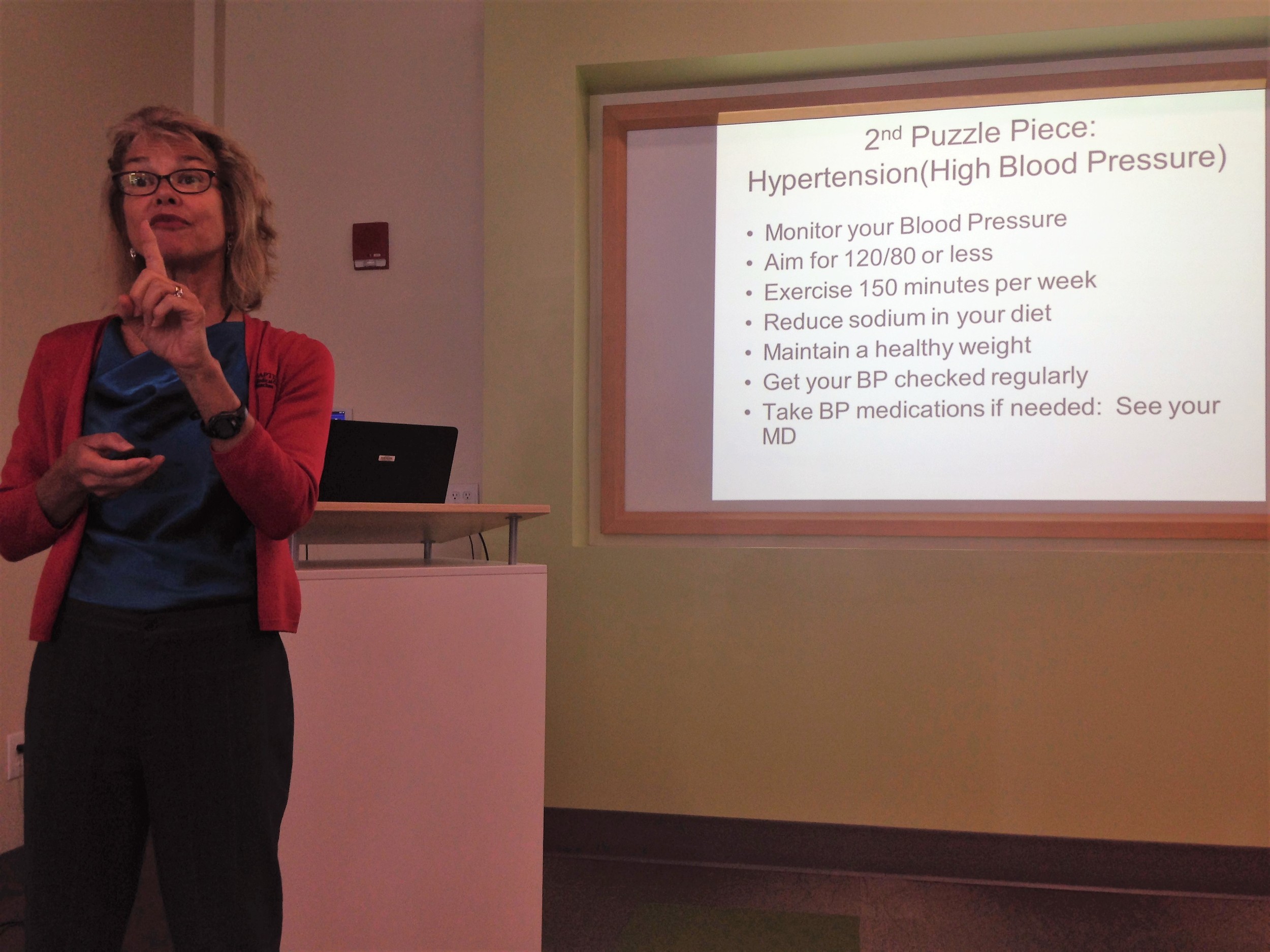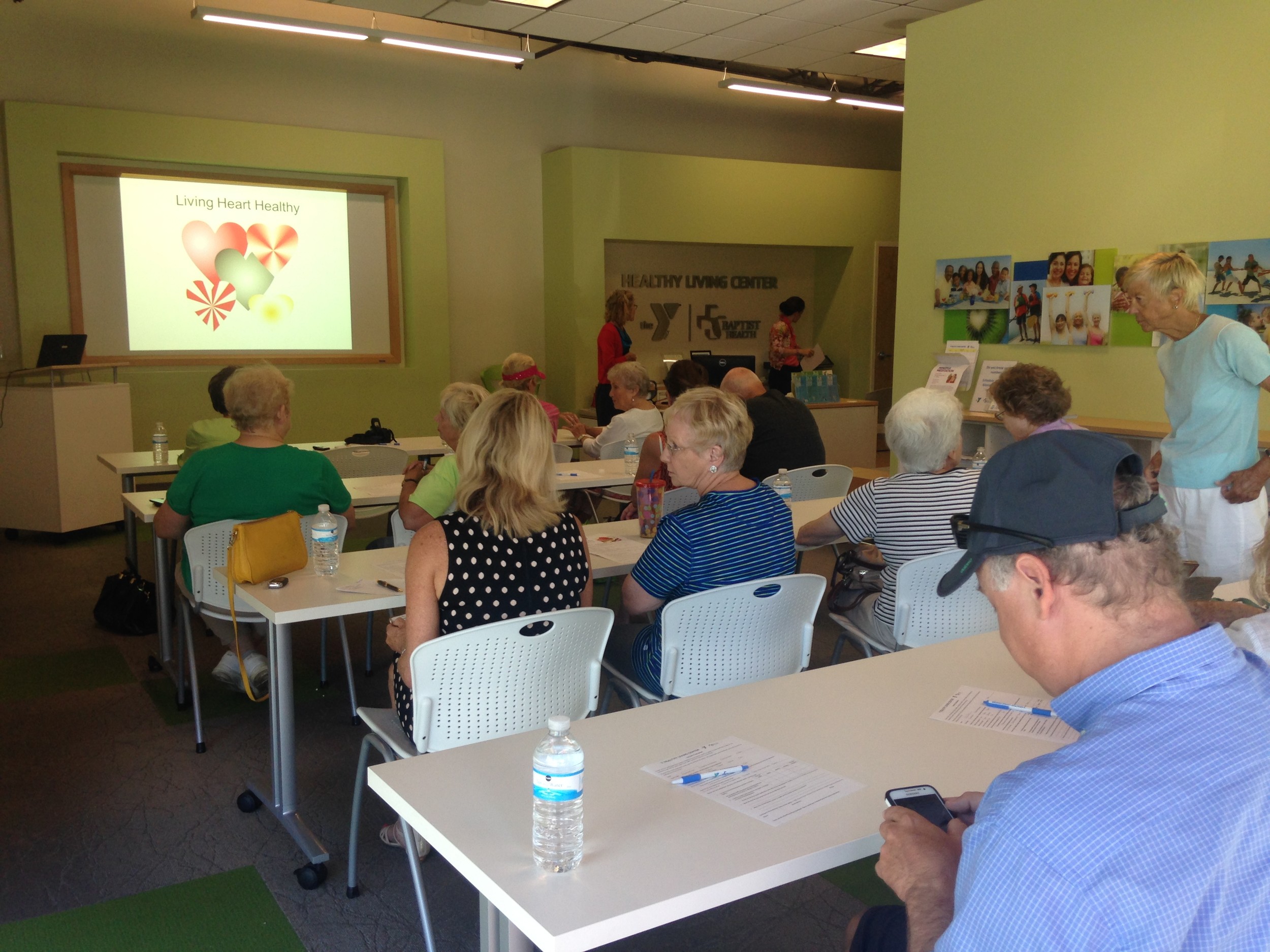Lowering your risk for heart attack: ‘Ask the Expert’ talk focuses on living a heart-healthy lifestyle
How cholesterol, glucose, blood pressure and BMI factor into a person’s risk for a heart attack was the focus of “Ask the Expert: Living Hearth Healthy,” presented Aug. 25 at the Y Healthy Living Center in Ponte Vedra.
Sara Holloway, supervisor of cardiac and pulmonary rehabilitation at Baptist Medical Center Beaches, offered several tips on how to reduce the chances of having a cardiac episode. A certified clinical exercise physiologist, Holloway said diet and exercise are key, as is monitoring cholesterol, glucose, blood pressure and BMI.
“Know your numbers,” she said.
Holloway identified seven “puzzle pieces” that could modify cardiac risk factors: inactivity, high blood pressure, high cholesterol, obesity, stress, diabetes and smoking. The good news is that cardiac risk factors can be impacted by a heart-healthy lifestyle, with the possible exception of genetics, such as if there is a family history of heart conditions, and age.
“As we age, we become more likely to have a cardiac event,” Holloway said, adding that over time, plaque builds up in the arteries, thereby increasing one’s chances of having a cardiac episode.
“Learning how to live heart healthy and prevent a heart attack is vital,” she said.
Inactivity
Inactivity or a sedentary lifestyle can be detrimental to your overall health.
“This is a puzzle piece we can all do something about,” Holloway said.
She recommended aiming for 30 minutes of moderate cardiovascular or aerobic exercise most days of the week, with a total goal of 150 minutes of cardiovascular exercise per week. In addition to cardiovascular exercise, Holloway recommends incorporating strength training two to three times per week.
She also highly recommends stretching exercises, especially after a workout, because it helps bring the heart rate down. Stretching also keeps joints limber and helps an individual keep range of motion, thereby reducing the chances of injury.
High blood pressure
High blood pressure, or hypertension, can often go undetected.
“A very high percent of people that come in for a cardiac event, have high blood pressure,” Holloway said, adding that many people don’t know they have high blood pressure.
She also noted that an individual is more susceptible to having high blood pressure as they age. That’s why, she said, it’s imperative to have your blood pressure checked regularly and to control hypertension with medication if needed. If blood pressure is not under control, it could lead to a heart attack or stroke.
Every person is different, but on average, you should aim for a systolic number – or top number – of 120 or less and a diastolic number – or bottom number - of 80 or less.
In addition to exercise, other ways to lower blood pressure include maintaining a healthy weight and reducing the amount of sodium consumed, paying special attention to eating out and consuming canned or packaged food which could all be sources of high sodium, according to Holloway.
Cholesterol
In addition to monitoring blood pressure, cholesterol levels should also be regularly checked.
LDL or “bad cholesterol” levels should be 100 or less. Having a high LDL helps contribute to plaque buildup in the arteries.
Known as “good cholesterol,” HDL levels should be 45 or greater.
Holloway offered an easy trick to remember the difference between LDL and HDL cholesterol – think “lousy” for LDL and “happy” for HDL.
Another level that is essential to monitor, Holloway said, is triglycerides, a type of fat in the blood. An individual’s triglycerides level should be 150 or less.
Treatment for high cholesterol includes following a heart-healthy nutrition plan, exercise, maintaining a healthy weight, getting regular cholesterol screenings and taking medications, if needed. Holloway suggested that if a person is experiencing side effects from cholesterol medication the consult their physician to consider trying an alternative medication.
Obesity
“You don’t have to take a lot of weight off,” Holloway said. Reducing your weight by just 10 percent can lower your blood pressure, lower your cholesterol level and reduce your risk of diabetes.
To evaluate your weight, have your Body Mass Index (BMI) calculated and check your waist circumference. To obtain the waist circumference, place a tape measurer on bare skin at the narrowest part of the torso, above the belly button. Men should aim for a waist circumference of 40” or less; women 35” or less.
To lose weight, increase exercise to 300 minutes per week, or 30 minutes of exercise, five days a week. Seek help from a dietician or physician, or make an appointment with a psychologist or counselor if emotional eating is a factor, Holloway said.
Stress
Work on reducing stress and find ways of dealing with stress, Holloway recommends.
Deep breathing works as both a stress reducer, and it can also help lower blood pressure, Holloway said. Her recommendations for coping with stress include meditation, spending time in nature, taking a gentle yoga class, listening to your favorite music, and laughing – finding the humor in stressful situations.
“Learn how to manage the stress so it doesn’t affect your health,” she said.
Diabetes
As with cholesterol levels and blood pressure, glucose screenings should also be done regularly. Aim for a fasting blood glucose level of 100 or less.
“As we age, we might be at a greater risk – especially if there is a family history,” Holloway said.
So, knowing your family history, as well as getting at least 30 minutes of cardiovascular exercise every day and following a heart healthy diet are important steps to take in diabetes prevention.
If diabetes is already a factor, monitor your blood sugar and take medications as prescribed, said Holloway, also noting that losing weight can be help significantly in managing diabetes.
Smoking
Holloway had a simple, one-word solution to this risk factor – “don’t.” “If you smoke, seek help to quit,” she said.
Y Healthy Living Centers, a partnership between YMCA and Baptist Health, offer “Ask the Expert” and “Talk with a Doc” lectures free of charge. The lectures are open to the community; you do not have to be a YMCA member to attend either event, however, seating is limited, so pre-registration is recommended. Register online at eventbrite.baptisthealth.com.










